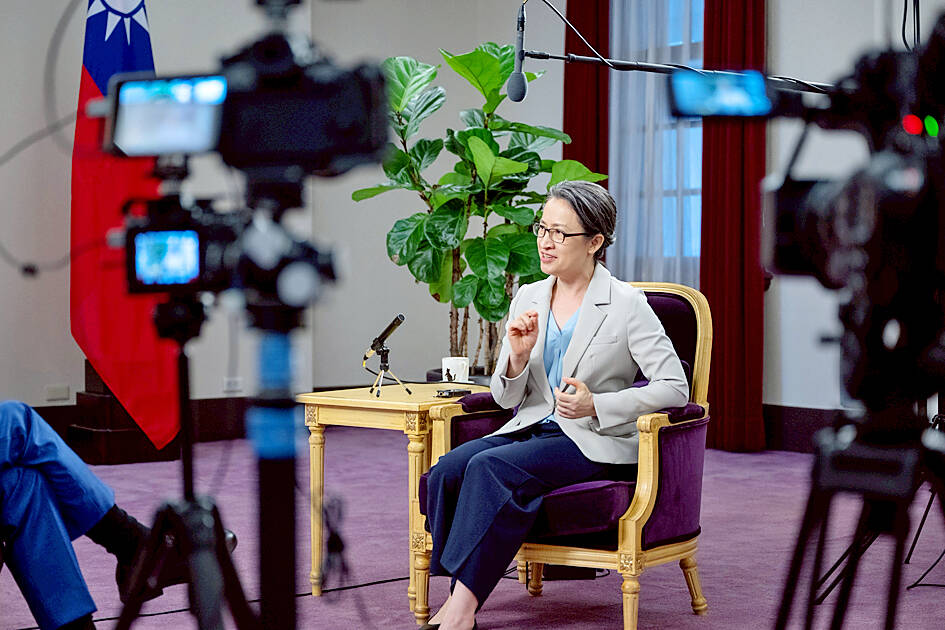Taiwan is doing everything it can to prevent a military conflict with China, including building up asymmetric defense capabilities and fortifying public resilience, Vice President Hsiao Bi-khim (蕭美琴) said in a recent interview.
“Everything we are doing is to prevent a conflict from happening, whether it is 2027 or before that or beyond that,” Hsiao told American podcaster Shawn Ryan of the Shawn Ryan Show.
She was referring to a timeline cited by several US military and intelligence officials, who said Chinese President Xi Jinping (習近平) had instructed the Chinese People’s Liberation Army to be ready to take military action against Taiwan by 2027.

Photo: Screen grab from the Presidential Office’s Flickr page
Faced with China’s continued naval expansion and its globally dominant defense manufacturing capacity, Taiwan is focused on “investing in our own defense in an asymmetric way” to complicate Chinese military calculations and deter an attack, Hsiao said.
With China continuing to lay claim to Taiwan and enforcing that rhetoric through diplomatic, military and economic tools on a global scale, Taiwan needs to promote the idea that retaining the “status quo” in the Taiwan Strait is in the best interests of all stakeholders around the world, including China, she said.
In addition to military threats, Taiwan also faces “cognitive warfare, disinformation and efforts to divide our society, weakening our unity and cohesion,” Hsiao said. “We are in a race to make ourselves much more resilient.”
The government is pursuing whole-of-society resilience efforts primarily aimed at equipping people with the ability to protect themselves, which would ease some of the burden on the government, she said.
While Taiwan is used to responding to earthquakes and other natural disasters, it still needs to work on its first-aid training, improve its emergency response capabilities, stockpile critical supplies and prepare shelters, Hsiao said, adding that society must change its perceptions about how to manage emergency response situations.
“Historically, [in] every disaster, [what] we have had is the military supporting civil society. What we have not really experienced is going the other way around — our civil society supporting our defense, our military,” she added.

The Ministry of Foreign Affairs (MOFA) yesterday voiced dissatisfaction with the Comprehensive and Progressive Agreement for Trans- Pacific Partnership (CPTPP), whose latest meeting, concluded earlier the same day, appeared not to address the country’s application. In a statement, MOFA said the CPTPP commission had "once again failed to fairly process Taiwan’s application," attributing the inaction to the bloc’s "succumbing to political pressure," without elaborating. Taiwan submitted its CPTPP application under the name "Separate Customs Territory of Taiwan, Penghu, Kinmen and Matsu" on Sept. 22, 2021 -- less than a week after China

THE GOOD WORD: More than 100 colleges on both sides of the Pacific will work together to bring students to Taiwan so they can learn Mandarin where it is spoken A total of 102 universities from Taiwan and the US are collaborating in a push to promote Taiwan as the first-choice place to learn Mandarin, with seven Mandarin learning centers stood up in the US to train and support teachers, the Foundation for International Cooperation in Higher Education of Taiwan (FICHET) said. At the annual convention of the American Council on the Teaching of Foreign Languages held over the weekend in New Orleans, Louisiana, a Taiwan Pavilion was jointly run by 17 representative teams from the FICHET, the Overseas Community Affairs Council, the Steering Committee for the Test of Proficiency-Huayu, the

A home-style restaurant opened by a Taiwanese woman in Quezon City in Metro Manila has been featured in the first-ever Michelin Guide honoring exceptional restaurants in the Philippines. The restaurant, Fong Wei Wu (豐味屋), was one of 74 eateries to receive a “Michelin Selected” honor in the guide, while one restaurant received two Michelin stars, eight received one star and 25 were awarded a “Bib Gourmand.” The guide, which was limited to restaurants in Metro Manila and Cebu, was published on Oct. 30. In an interview, Feng Wei Wu’s owner and chef, Linda, said that as a restaurateur in her 60s, receiving an

Kaohsiung Mayor Chen Chi-mai (陳其邁) on Monday announced light shows and themed traffic lights to welcome fans of South Korean pop group Twice to the port city. The group is to play Kaohsiung on Saturday as part of its “This Is For” world tour. It would be the group’s first performance in Taiwan since its debut 10 years ago. The all-female group consists of five South Koreans, three Japanese and Tainan’s Chou Tzu-yu (周子瑜), the first Taiwan-born and raised member of a South Korean girl group. To promote the group’s arrival, the city has been holding a series of events, including a pop-up